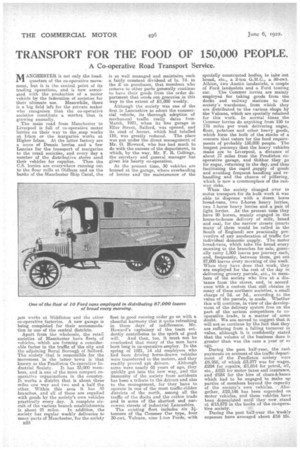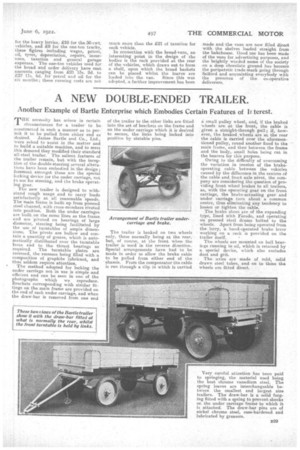TRANSPORT FOR THE FOOD OF 150,000 PEOPLE.
Page 12

Page 13

If you've noticed an error in this article please click here to report it so we can fix it.
A Co-operative Road Transport Service.
MANCHESTER is not only the headquarters of the co-operative movement, but it is the central point of its trading operations, and is now associated with the production of a motor vehicle by the federation of societies for their ultimate use. Meanwhile, there is a. big field left for the private maker who recognizes that the co-operative societies constitute a market that is growing annually.
The main road from Manchester to Liverpool is full of co-operative motor lorries on their way to the soap works at Irlam or the margarine works at Higher Irlam. At the latter factory are a score of Dennis lorries and a, few Landes for the transport of margarine to the retail societies, and Dyers; day a number of the distributive stores send their vehicles for supplies. Then the CS. lorries are everywhere running out to the flour mills at Oldham and on the banks of the Manchester Ship Canal, the Jam works at Middleton and the other co-operative factories. A new garage is being completed for their accommodation in one of the central districts.
Apart from the wholesale, the retail societies of Manchester have fleets of vehicles,which are forming a. considerable factor in the traffic of the city and the adjoining Royal Borougk of Salford. The society that is responsible for the movement in the latter town is that known as the Pendleton Co-operative In dustrial Society. It has 33,000 members, and is one of the most compact cooperative organizations in the country. It works a district, that is about three miles one way and two and a half the other. Within this arcs it has 40 branches, and all of these are supplied with goods by the society's own vehicles practically every day. A complete circuit of the various branch establishments
is about 21 miles. In addition, the society has regular weekly deliveries to many parts of Manchester, for the society B28 is so well managed and maintains such a fairly constant dividend of Is. 7d. in the £ on purchases, that members who remove to other parts generally continuo to have their goods from the order department that sends out groceries in this way to the extent of £1,000 weekly.
Although the society was one of the first in Lancashire to adopt the commercial vehicle, its thorough adoption of mechani Ca L traffic really dates from March, 1921, when its fine garage in Ellor Street, Salford, was opened, and its stud of horses, which had totalled 110, was greatly reduced. The place was put under the direct management of Mr. G. Howard, who has had much to do with the success of the department, to Which, by the way, Mr. F. R. Collinge, the secretary and general manager has given his hearty co-operation.
At the present time, 30 vehicles are housed at the garage, where overhauling of lorries and the maintenance of the fleet in good running order go On with a cheerful harmony that it quite refreshing in these days of indifference. Mr. Howard's captaincy of the team evidently contributes to the spirit of good will. And then, too, it must not, be overlooked that many of the men have been long in co-operative employ. In the spring of 1921, 14 old employees who had been driving horse-drawn vehicles were transferred to the motors, and they
readily proved apt drivers. Although some were nearly 60 years of age, they quickly got into the new way, and the immunity of the .society from accidents has been a tribute to the drivers and also to the management, for they have to operate in one of the most traffic-ridden districts of the north, among all the traffic of the docks and the cotton trade and in some of the shortest and narrowest streets of industrial Lancashire.
The existing fleet includes six 31tonners of the Commer Car type, four 30-cwt. Tulcans, nine 1-ton Fords, with specially constructed bodies, to take nut bread, etc., a 2-ton G.M.C., a 30-asvt. Albion, two Austin landaulets, a couple of Ford landaalets and a Ford touring car. The Commer lorries are mainly employed for taking goods from the docks and railway stations to the society's warehouse, from which they are distributed to the various shops by the Vulcans, which are specially retained for this work. In normal times the Commer lorries do anything from 150 to 175 miles per week delivering sugar, flour, potatoes and other heavy goods, which form the bulk of the stocks of a concern that caters for the food requirements of probably 150.000 people. The longest journeys that the heavy vehicles make are to Liverpool, a distance of about 37 miles from the Pendleton cooperative garage, and thither they go for sugar, returning in' theday, and thus facilitating the rapid supply of goods and avoiding frequent handling and rehandling and the chance of pilfering, which is now a commonplace of the railway risks. •
When the society changed over to motor transport for its bulk work it was able to dispense with a dozen horse bread-vans, two 2-horse heavy lorries, two 1-horse heavy lorries and a pair of light lorries. At' the present time they have 90 horses, mainly engaged in the house-to-house delivery of milk, bread and coal, for the narrow streets (courts many of them would be called in the South of England) are practically preventive of any acceleration of traffic for individual domestic supply. The motor bread-vans, which take the bread every morning to the branches for sale, generally carry 1,800 loaves per journey each, and, frequently, between them, get out 87,000 loaves every morning of the week. When they have done that work, they are employed for the rest of the day in delivering grocery parcels, etc., to members of the society who live at. a distance from the stores, and, in accord. ance with a custom that. still obtains in many of these northern societies, a E3rnall charge of 2d. or 3d., according to the value of the parcels, is made. Whether this will continue, in view of the development of the delivery system free on the part of the serious competitors to cooperative trade, is a matter of some doubt. We are moved to suggest that it will not so continue by the fact that they are suffering from a falling turnover in value, although it, is confidently stated that the volume of the business done is greater than was the case a year or so ago. During the past half-year, the cash payments on account of the traffic departe ment, of the Pendleton society were £6.955, of which £3,977 was for wages, £204 for repairs £1,014 for petrol, oil, etc., £825 for motor taxes and insurance, and .£934 for the hire of chars-i-bancs which had to be engaged to make up parties of members beyond the capacity of the society's own vehicles. Altogether, £22,146 has been expended on• motor vehicles, and these vehicles have been depreciated until they now stand at £13,572 in the books of the co-operative society.
During the past hall-year the weekly expenses have averaged about £16 10s.
for the heavy lorries, £10 for the 30-cwt. vehicles, and £9 for the one-ton trucks, these figures including wages, petrol, oil, tyres, depreciation, repairs, insurance, taxation and general garage expenses. The one-ton vehicles used for the bread and order delivery have cost amounts, ranging from £21 1s. 8d. to £27 us. 6d. for-petrol and oil for the six months ; these running costs are not
much more than the £21 of taxation for each vehicle.
In connection with the bread-vans, an interesting point in the design of the bodies is the rack provided at the rear of the vehicles, which draws out to form a shelf, upon which the bread baskets can be placed whilst the loaves are loaded into the van. Since this was adopted, a further improvement has been made and the vans are now filled direct with the shelves loaded straight from the bakehouse. Good use has been made of the vans for advertising purposes, and the brightly worded name of the society on a deep chocolate ground has become the peripatetic trade-mark going through Salford and acquainting everybody with the presence of the co-operative deliverers.






























